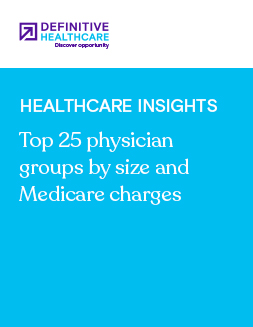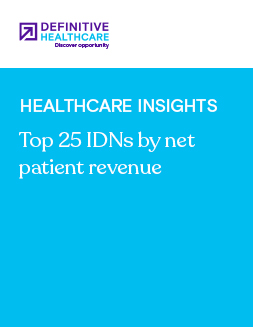Healthcare Insights
Top 10 hospitals performing TAVR procedures
Transcatheter aortic valve replacement (TAVR) is a minimally invasive procedure for patients diagnosed with aortic valve stenosis. This condition occurs when the aortic valve, situated between the left ventricle (the heart's lower chamber) and the body's main artery, the aorta, fails to open properly, leading to reduced blood flow from the heart to the body. The TAVR procedure replaces a thickened aortic valve that can’t fully open with an implantable medical device.
Procedural trends show a rise in the use of TAVR, which has become the preferred method for aortic valve replacement, surpassing traditional surgical approaches. This shift is largely due to the limitations of open-heart surgery, particularly for older patients or those with complex health conditions who may not be ideal surgical candidates. The growing adoption of TAVR has also been fueled by ongoing technological advancements, streamlined procedural techniques, and a decline in associated complications, factors that have collectively enhanced its appeal and accessibility in clinical practice, according to the American College of Cardiology.
Using data from the Definitive Healthcare Atlas All-Payor Claims Dataset, we ranked the top 10 hospitals leading in TAVR procedures by their share of overall U.S. procedures tracked in 2024.
| Rank | Hospital | % of TAVR procedures | Explore dataset |
|---|---|---|---|
| 1 | Mayo Clinic Hospital - Saint Mary's Campus | 1.05% | Explore |
| 2 | Cleveland Clinic Main Campus | 0.79% | Explore |
| 3 | Tisch Hospital | 0.77% | Explore |
| 4 | The Mount Sinai Hospital | 0.74% | Explore |
| 5 | Piedmont Atlanta Hospital | 0.70% | Explore |
| 6 | Cedars-Sinai Medical Center | 0.68% | Explore |
| 7 | Morristown Medical Center | 0.68% | Explore |
| 8 | New York-Presbyterian Weill Cornell Medical Center | 0.56% | Explore |
| 9 | St. Francis Hospital & Heart Center | 0.56% | Explore |
| 10 | Albany Medical Center | 0.54% | Explore |
Fig. 1 Data is from the Definitive Healthcare Atlas All-Payor Claims product. Data accessed June 2025.
The top three hospitals performing the highest share of TAVR procedures nationally are Mayo Clinic Hospital – Saint Mary’s Campus, Cleveland Clinic Main Campus, and Tisch Hospital. Mayo Clinic leads with the largest proportion, reflecting its strong reputation in cardiovascular care. Cleveland Clinic and Tisch Hospital follow closely, both recognized for their advanced cardiac programs and expertise in minimally invasive heart procedures. These institutions stand out not only for their volume but also for their role in shaping best practices in TAVR care.
How many TAVR centers are there in the U.S.?
The exact number of TAVR centers in the U.S. fluctuates slightly due to the dynamic nature of healthcare facilities expanding or adjusting their capabilities. In 2024, more than 800 hospitals performed TAVR procedures, reflecting an ongoing increase in the adoption of this less invasive technique for treating aortic valve stenosis.
While the overall number of centers offering TAVR has grown, high-volume centers, which perform a significant number of these procedures annually, tend to be more concentrated. These high-volume centers are critical as they often have better outcomes and lower complication rates due to their extensive experience and specialized resources.
What risks and complications are associated with TAVR?
Like any medical procedure, TAVR carries certain risks and potential complications. Here are some of the primary risks and complications associated with TAVR:
- Vascular complications
- Stroke and neurological events
- Paravalvular leak
- Conduction system injuries
- Valve malpositioning or embolization
- Cardiac complications
- Infection
- Mortality
Despite these risks, TAVR has been shown to significantly improve survival and quality of life in patients with severe aortic stenosis, especially those who are at high or prohibitive risk for surgical aortic valve replacement. Each patient's risk profile should be thoroughly evaluated by their healthcare team to determine the most appropriate treatment approach.
What kind of doctors perform TAVR procedures?
TAVR procedures are performed by a specialized team of healthcare professionals. This team typically includes interventional cardiologists, who specialize in catheter-based treatments for heart diseases, and cardiothoracic surgeons, who bring their expertise in cardiac anatomy and surgical techniques, especially for handling potential complications that may necessitate open-heart surgery.
Cardiac anesthesiologists play a crucial role in managing anesthesia and monitoring vital functions during the procedure. Imaging specialists, such as radiologists or cardiologists with expertise in cardiac imaging techniques provide real-time imaging guidance to ensure accurate valve placement.
General cardiologists are often involved in the pre-procedure evaluation, intra-procedure care, and post-procedure follow-up, managing any cardiac-related issues that may arise. Additionally, specialized cardiac nurses and technicians assist in preparing the patient, monitoring during the procedure, and providing post-procedure care, ensuring that all necessary equipment is available and functioning properly.
The collaboration of this multidisciplinary team is essential for the success of TAVR procedures, as each member contributes a unique set of skills and expertise to handle the various aspects of the procedure from preoperative planning to postoperative care.
Learn more
Healthcare Insights are developed with healthcare commercial intelligence from the Definitive Healthcare platform. Want even more insights? Start a free trial now and get access to the latest healthcare commercial intelligence on hospitals, physicians, and other healthcare providers.


